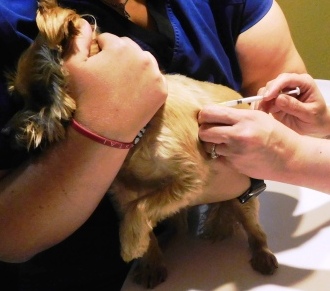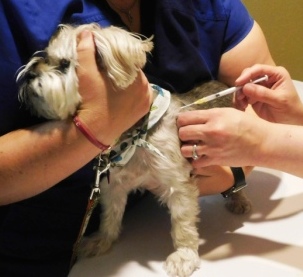Disclosure: My dog blog is supported by dog parents just like you. I only recommend products that I would use on my dogs. All opinions expressed here are my own. I sometimes earn a small affiliate commission, at no extra cost to you, when you click through the affiliate link and purchase something. You can read more about my affiliate policy here.

We, as dog parents, have so much responsibility in the overall care of our fur babies. Most importantly, health care should be our number one priority in keeping our dogs safe, healthy and happy. Since it is American Heart Health Month, I thought February would be a good month to discuss dog heartworm prevention. Plus, the fact that canine heartworm disease has been diagnosed in all 50 states in the United States of America.
First of All, What are Dog Heartworms?
Heartworms are parasites transmitted by mosquitoes. And, by the way, it only takes one infected mosquito to leave a larvae form of the parasite behind when they bite.
It takes about seven months, once a dog is bitten by an infected mosquito, for the larvae to mature into adult heartworms. As a result, when the heartworms reach adulthood, they travel to the lungs, heart, and major vessels connecting to these organs.

After that, the adult worms lodge themselves in the heart, lungs, and major vessels, growing up to a foot long! Gross! Furthermore, they can live five to seven years. Ugh! What’s even more gross is a dog can have as many as 250 worms in its system! The cycle begins again every time the adult female worms release microfilariae, their offspring, into a dog’s bloodstream. See a graphic of the heartworm life cycle in dogs.
If left untreated, the heartworms can cause a whole host of health problems that threaten our dog’s survival. But the good news is, as responsible dog parents, we can practice dog heartworm prevention! This will help our fur babies from ever getting nasty heartworms in their heart and lungs.
Prevention is Way More Affordable Than Treatment
As opposed to high dollar treatment, prevention is less costly and much safer, according to the American Heartworm Society (AHS). For example, the monthly prevention cost for a medium-sized dog’s entire life is less than just one treatment. That one treatment would cost approximately $1,000.
Treatment requires multiple visits to the veterinarian, blood tests, x-rays, hospitalization and a series of injections. Therefore, as the dog parents, our pocketbooks take a big hit.

Besides being hard on our pocket book, the heartworm treatment is not easy on our fur babies either. It can be potentially toxic to their body and can cause serious complications. For instance, life-threatening blood clots to a dog’s lungs could form.
Plus, our fur babies are not immune to reinfection, so the seriousness of heartworm disease makes its prevention extremely important.
Dog Heartworm Prevention Starts With a Heartworm Test
The first step in dog heartworm prevention is having your veterinarian check your fur baby for heartworms. It takes roughly 6 months for an infection to be detected with a standard heartworm test. Veterinarians recommend having a dog tested annually.
Annual testing is important, because the time from infection to adult worms is roughly six months. Meaning, some pets may have been infected with juvenile worms that did not originally result in a positive test but have since matured into adult worms that are doing irreversible damage.
Dr. David Dilmore, DVM
Banfield Pet Hospital
Your dog can be tested for heartworms at seven months old or older before starting heartworm prevention. Although having an annual test is recommended, the frequency really involves several factors.
Those factors include:
- the dog’s age when starting heartworm prevention
- if and for how long did a dog parent forget to give heartworm prevention
- was one type of heartworm prevention switched to another
- did a dog recently travel to an area where heartworm is more common
Even though a dog is on a type of heartworm prevention, the AHS recommends annual testing for heartworms. The AHS promotes Think 12, which is six do’s and six don’ts of dog heartworm prevention.
Dog Heartworm Prevention Medication
The AHS strongly advises preventive medication once a dog tests negative for heartworms. Some dog parents like the option of monthly medication, while others prefer shots, which are administered every six months.
As a dog parent, you will have to factor in your busy schedule. In other words, will you remember to give your fur baby those monthly tablets? You will also need to consider your dog’s susceptibility. For example, does a vet visit cause extra stress for your fur baby? Or does he or she have a hard time taking oral medication?
Most importantly, you need to understand medication does not stop the infection from occurring, nor does it kill adult heartworms. However, the medication will kill the larvae before they become adult heartworms. This is why it’s super important to stay current with heartworm preventive medication.
Monthly Options
There are several types of monthly heartworm preventive medications available. Most of the medications are a monthly oral chewable pill, such as Heartgard Plus, Interceptor, Sentinel, Sentinel Spectrum, and Trifexis, to name a few. Advantage Multi and Revolution are a couple of topical options.
Most monthly chewable medications can also protect your fur baby against common intestinal parasites, like whipworms, roundworms, and hookworms. You will want to discuss with your veterinarian as to which chewable or topical is right for your fur baby.
Certainly, these medications, when used year-round, provide effective dog heartworm prevention. However, before your veterinarian will prescribe these medications, your dog will need to be tested for heartworms.
The Twice a Year Shot Option
The most traditional choices for heartworm prevention are topical and oral medications, but some veterinarians endorse heartworm shots. These shots are administered just twice a year and provide six months of protection. The shot will also treat hookworm infections.

ProHeart 6 (Moxidectin) is the only FDA-approved heartworm shot available at this time. To ensure that dosing is accurate, ProHeart 6 can only be administered by a certified veterinarian. It is injected under the skin on either the left or right side of the base of a dog’s neck.
Just like before prescribing a monthly medication, your veterinarian will not give your fur baby the ProHeart 6 shot without a heartworm test. As the dog parent, it will be your responsibility to make sure your veterinarian is certified to administer the ProHeart 6 shot.
Also, your veterinarian is required to provide you with the Client Information Sheet for ProHeart6, as well as review it with you before administering the shot. Your veterinarian should also advise you to observe your fur baby after the shot is administered for potential drug toxicity described in the provided Client Information Sheet for ProHeart6.
My Choice
First of all, it is comforting to know that there are so many options out there to help us as dog parents protect our fur babies from this gross heart condition. The thought of a worm a footlong being lodged in my little fur baby’s heart or lungs makes me literally want to puke.
In the past, I chose to go with a monthly preventive option. However, I found myself forgetting to give the dosage at the exact same time every month and I will be honest, some months were skipped altogether. I realized that forgetting the dosing was continuing to put my babies at risk for heartworms, so I visited with my veterinarian, Dr. Johnson at Yarbrough Veterinary Clinic, about the shot option.

The 6-month duration of the shot and the need for Dr. Johnson to administer it has kept me accountable for twice-annual check-ups. Plus, it has helped me keep my babies current on all of their vaccinations.
Dr. Johnson did make me aware of some adverse side effects being reported, such as allergic reaction, lethargy, vomiting, diarrhea, seizures, weight loss, weakness, increased thirst/urination, and bleeding/bruising.
Thankfully my fur babies have not had any of those adverse side effects in the past three years they have received the ProHeart 6 shot. On the other hand, I have been aware of other pet parents who have gone through adverse side effects, especially seizures, with their fur babies.
So, it goes back to making sure you gather as much information as possible on dog heartworm prevention and discuss it with your veterinarian.
One More Prevention
Taking care of the pesky, annoying mosquitos that could be infected in the first place is a heartworm prevention often overlooked. You can help control the mosquito population in your neighborhood and especially your yard as a way to control the spread of heartworm.
Here are some ways:
- dump out any standing water (that’s where mosquitoes lay eggs)
- plant flowers that naturally repel mosquitoes (marigolds, lavender, rosemary)
- use chemical repellent sprays found at WalMart or Lowe’s
- if it fits your budget, have your yard treated professionally
In Conclusion…
Together as pet parents, let’s use and promote proactive prevention so future studies will show a decline in the number of confirmed heartworm cases in the United States.
Keep in mind that prevention is easier on our fur babies and our pocketbooks than treatment. It is our responsibility to seek the best information for dog heartworm prevention and do plenty of research before deciding on a heartworm preventive. We can start with our veterinarians, who can guide us in the best preventive route for our fur babies.
You might be interested in these articles from the Snoot and Toebean’s Health and Wellness section for the overall health of your fur baby:
What have been your experiences with dog heartworm prevention? Let me know by leaving a comment below.
If you would like to save this post to read again later, you can use one of the following photos to pin to Pinterest…





